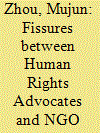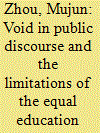| Srl | Item |
| 1 |
ID:
159844


|
|
|
|
|
| Summary/Abstract |
This article uses a case study to analyse the fissures between human rights advocates and NGO practitioners. Since 2009, the Open Constitution Initiative, an organization run by human rights advocates, has been campaigning for migrant children's right to attend local schools. While fragmented resistance on the same issue has long existed in activities organized by migrant community NGOs, there has been almost no cooperation between the two parties during the campaign. Based on ethnographic research, I elaborate on how these two groups of activists differ in their strategies and goals, and how their choices are related to their understanding of political struggle and political transformation. I contend that this case provides a new lens through which to view the recent decline in some human rights activism in China, and illustrates the importance of investigating the internal structure of civil society.
|
|
|
|
|
|
|
|
|
|
|
|
|
|
|
|
| 2 |
ID:
153637


|
|
|
|
|
| Summary/Abstract |
Because of the huge impact of the hukou system (户口制度) on the allocation of educational resources in China, migrant children’s access to schools has long been circumscribed. Since 2009, a group of migrant parents in Beijing has been involved in a movement demanding their children’s right to sit for the college entrance exam in the city. Using ethnographic methods, this article reviews how the idea of equal education was contested among four groups: (1) liberal intellectuals as the leaders of the movement; (2) middle-class migrant parents as the major activists; (3) working-class migrant parents as the subjects for mobilization; and (4) participants in counter-movements. Despite the involvement of liberal intellectuals that has helped the movement make an inclusive claim, the movement has largely remained parochial, and to some extent it even served to reinforce inequality in China’s education system. I use the equal education movement as a case to reflect upon the ‘boundary pushing’ approach in studies on China’s public sphere, and contend that researchers should pay more attention to the internal power dynamics of social movement.
|
|
|
|
|
|
|
|
|
|
|
|
|
|
|
|